The Battle of Warsaw is undoubtedly one of the most important events in the history of Poland. However, to this day, there is a dispute as to whether the heroic victory over the Red Army was the result of an excellent strategy of the commanders or a symbolic "miracle" after the intervention of divine forces. And the conflict started right after the battle ...
The memory of the battle ignites the imagination to this day. Due to its long-term consequences - the defense of Polish independence and the containment of the Bolshevik revolution throughout Europe - it is considered the 18th most important battle in the history of the world. How was this event recorded in the participants' memories?
The Battle of Warsaw - victory written in the stars?
Aleksandra Piłsudska née Szczerbińska:
When I returned to Warsaw, [Piłsudski] was already a victorious leader. The Russian army was defeated. After returning from the front, he indignantly showed me a piece of paper that someone had placed on his desk during his absence from Warsaw. The card said, "The stars say the fifteenth will be a victory" . His indignation knew no bounds.
"I put so much brain work into my concepts, into my plan, I had to overcome obstacles to put them into practice, and it turns out that there was nothing of mine in everything. The stars did everything. " He was deeply touched and believed in the work of the human brain and the importance of human will.
The husband had a great grudge against the public for believing his political opponents that the plan of the victorious battle and the victory itself should be owed to a French general and France, and not to a Polish commander and a Polish soldier. Shame was haunting him.
After the battle
August 25. This day was assumed to be the end of the Battle of Warsaw. As a result of the August offensive, 25,000 Bolshevik soldiers were killed, 66,000 were captured, and about 40,000 fled to East Prussia. The Poles captured 231 guns and 1,023 machine guns. On the Polish side, there were 5,000 killed and about 10,000 missing. Three Bolshevik armies have been shattered - their remnants are breaking through to the east.
Col. Julian Stachiewicz, commander of the 65th Infantry Regiment, in a letter to General Leon Berbecki:
The victory in this great battle for Warsaw is not general at all, but the energy and speed of action extracted from the soldiers goes beyond everything that has existed so far. I consider this battle to be one of the most interesting, and in its consequences the most significant, that the world has ever experienced.
Siedlce, August 24.
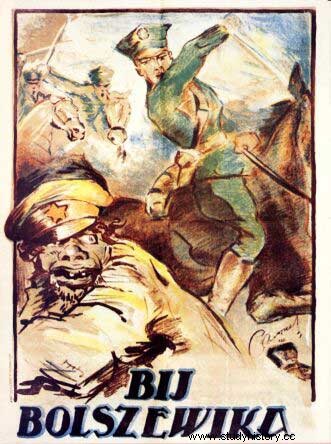
Polish propaganda poster from 1920
Eustachy Sapieha, Minister of Foreign Affairs of the Republic of Poland, in a dispatch to the Polish legation in London:
You can consider the victory near Warsaw final. The Bolshevik army, defeated, no longer puts up any serious resistance. Tens of thousands of prisoners every day. So far, 70,000. Peasants armed with scythes and pitchforks bring them by the thousands. Huge catch. Białystok is occupied, which cuts off the rest of the Soviet army.
Please take advantage of the moment that Poland defended itself before the Allies rushed to help, because so far we have not received any concrete help, except for the considerable moral support of France, which kept Germany in check with its loyal ally position. Emphasize the futility of the blockade of Poland by revolutionary elements - in the face of the patriotic attitude of the entire population.
Warsaw, August 24
Michał Kossakowski:
I took a little look at Warsaw; it must be admitted that a lot had been done for the defense, that the capital woke up when it was already critical. It even managed to advertise itself. There is no longer any doubt in the streets that Poland is at war. The precious grains have separated from the chaff. […]
The widespread gust seems to be dying out. The great battle for Warsaw, for Poland's freedom - over.
Warsaw, August 26
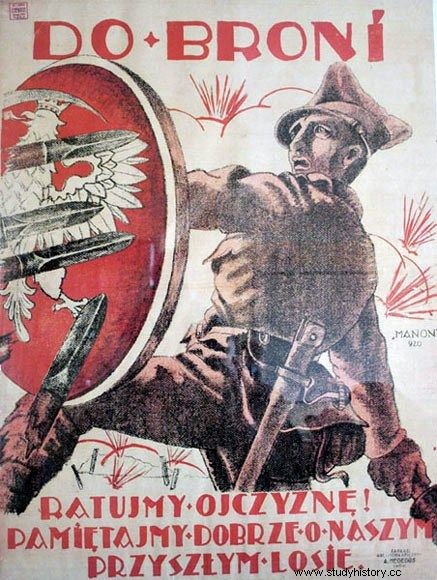
Polish recruitment poster from 1920
Juliusz Zdanowski:
On Wednesday, [Aleksander] Skarbek applied to the State Defense Council for a proclamation thanking the chiefs and the army for the defense of Warsaw, and the second, thanking the French. From the first, Witos thanked only the soldiers. There was a long discussion on the second one only at yesterday's meeting.
Piłsudski stated that the French only interfered, that they absolutely demanded a withdrawal to the San, that the French defense plan was rejected by him that Rozwadowski's plan was equally rejected, that he himself won with his plan. Rozwadowski repeated [...] the sentence about disturbing and even added that he had a lot of trouble with the French, because they imposed their advice on them - and that he had to warn his officers against the French who were trying to "spy" on all activities. […] [Foreign Minister Eustachy] Sapieha also spoke out against it, crying that the demonstration for the French was an insult to national dignity. [...] Then there was a discussion about war and peace. What territorial goals should be set for peace, what positions should be filled in the event of a truce or prolonged war.
Our people are restrained from high aspirations by the Curzon line marked out by the Entente and their disbelief in the army, the left, and the will to make peace. Piłsudski, who directly demanded a further war, remained in isolation with two of his generals. I must admit that I rather agree with him here. Making peace on the Curzon Line packs Bolshevism under our side, enables them to beat [gen. Peter] Wrangel and return to the Bug River in the spring. Pitsudski is logical here, demanding an alliance with Wrangl and not believing in keeping peace by making peace.
Warsaw, August 28
The case of General Maxime Weygand
General Maxime Weygand, adviser to the chief of the Polish General Staff, leaves Poland, is greeted in France as the main winner of the Battle of Warsaw and is awarded the Grand Order of the Legion of Honor. Three days earlier, British Prime Minister David Lloyd George issues a communiqué condemning the Bolsheviks for attacking Poland and emphasizes the role of the Warsaw allied mission in the battle, ignoring the success of Józef Piłsudski.
Juliusz Zdanowski:
Yesterday's demonstration for Weygand was a great success. Women's organizations, to which my wife belongs, gave him a bronze copy of Christ from the steps [of] St. Cross. In gratitude, he said that this gift made him a great pleasure, because for the entire time of the Battle of Warsaw, every day at St. He prayed for the Cross.
Warsaw, August 25
gen. Maxime Weygand adviser to the chief of the Polish General Staff:
The wonderful Polish victory will have consequences of incalculable importance for the international situation. It will consolidate the Polish State, the existence of which is necessary for the security of France. Germany, which had already hoped to enter into direct relations with the Soviets to throw the red armies against the enemy across the Rhine, will be forced to renounce the abolition of the Treaty of Versailles by these means. […]
This victory, which is the reason for the great holiday in Warsaw, is a Polish victory. The anticipatory military operations were performed by Polish generals on the basis of the Polish operational plan. My role, as well as that of the French mission officers, was limited to filling in a few gaps in the details of the execution. […] It was the heroic Polish nation that saved itself.
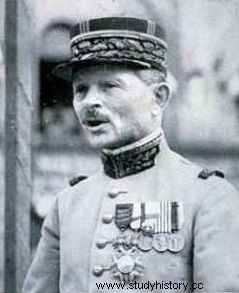
Gen. Maxime Weygand
Ignacy Daszyński, Deputy Speaker of the Sejm:
Great glory, complete triumph. Enemy smashed, free Poland, Europe freed from the nightmare of the "red army", capturing horses in the Rhine ... The second Grunwald in its far-reaching consequences. But the "compatriots" are watching. Mr. Marshal [Wojciech] Trąmpczyński and Mr. Count. Adam Zamoyski set up a couple of dozen aristocratic women in the courtyard of the Krasiński Palace in Warsaw to await the winner.
Here comes the winner, not Piłsudski, but French general Weygand. The directors give a sign; the women kneel on the pavement of the yard and kiss the hands of the actual "winner", because it is impossible that this winner was Piłsudski. At the same time, at the Christian Democracy assembly, a canon known in Warsaw speaks to several dozen people. He calls Piłsudski "a vile coward and a traitor." […]
I do not get into the consideration of General Weygand's plan of salvation, because this plan was never carried out. The Polish army carried out Piłsudski's plan and won. […]
But because General Weygand lives in France, so the "Miracle on the Vistula" was devised, General Haller, Sikorski, Fr. Skorupka, and finally Our Lady of the victors as long as we do not owe Piłsudski's rescue, although a layman can easily understand the essence of this salvation, its course of war and its importance. The difference between the French and Polish projects lay - among other things - also in the fact that the French proposed to leave Eastern Galicia as far as the San line. This was in line with the political intention to get rid of the diplomatic trouble France and England had with East Galicia at the time. It was quietly reserved for a future "reborn" Russia ...
Piłsudski did not want to leave Lviv. The military significance of Lviv at that decisive moment lay in the fact that Budyonny's army had just lost those few days near Lwów, during which there was a lightning march of four Polish divisions to the north under Piłsudski's personal command and the cutting of Russian armies. Too late, Budyonny rushed north to the rear of these divisions, but it was too late. Beaten near Zamość, he fled to the east. If Eastern Galicia had been vacant with the Polish army, the Poles would have lost the entire campaign, and by withdrawing from Lviv, they would have lost Eastern Galicia and Lviv politically.
It would seem that the "national" Polish parties should praise Piłsudski for this, that he did not obey the French plan and did not withdraw from Eastern Galicia! Instead of praise, however, the "nation" Poles tried to insult, public insults, clowns such as kissing hands ... General Weygand ... still needed to make a man bitter?
Supernatural forces?
Lieutenant Wojciech Stpiczyński, fighter, politician, journalist:
The exaggeration in ascribing to supernatural forces decisions in resolving the fundamental issues of national life must make this attitude more and more clearly passive, in the broader sense of the word, inactive. Meanwhile, it is doubtful that anyone will be able to indicate in history an example of a positive miracle in a nation passive to the phenomena and processes of its life, producing miraculous, extraordinary results. On the contrary, the so-called miracles always follow in the footsteps of supreme effort and perfect human virtues, as if God himself desired to instruct his earthly children that one must believe in him by deeds that produce social values. […]
A miracle! A garland of miracles - thousands and tens of thousands - a miracle in a boy from a quiet, emaciated village, which suddenly, like a hardened and steel-chained companion from a Hussar banner, was walking towards the enemy with the dance steps of heroic insolence; a miracle in his mother, which strengthens him, blesses him, offers him to his motherland; a miracle in a hard-hitting worker who runs away from his children and wife to his homeland, contradicting, with a rifle in his hand, the lies of the proletarian slogans of the Bolshevik invasion; and in this sluggish intellectual chick-pupil who makes the rifle with the utmost effort, he becomes a hero on the battlefield; including the peasant from Minsk, Ostrołęka, Łomża, Kolno and so many other cities and towns that, having tasted the bread of the invasion, with a stake and pitchfork, accompanies the victorious offensive of our troops, burning with a desire for "vengeance, vengeance on the enemy." […]
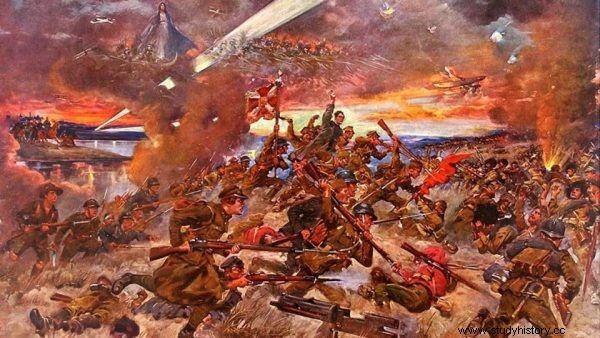
Jerzy Kossak, The Miracle on the Vistula
In the ranks of the initially voluntary, then normally recruited army, the fraternity of all states triumphs in the face of fighting the invasion. A worker, who in the legion's battles has achieved the beautiful officers' stars, commands intelligentsia, craftsmen, peasants - elsewhere a peasant officer commands - then a worker under the command of a nobleman goes into battle. Nobody asks anyone about their origins, nobody looks for indigenous people; the democratic toll of death for the homeland has a counterpart in the democratic merit of the victory of the democratic military. The whole nation, from all peaks to all ditches, in all sections, creates armed forces who protect Poland from invasion; the entire nation, with the entire resource of moral and material forces that is currently being mined, supports the movable shaft of the fighting front.
Victory is won by Poland, which is internally framed and equally for all her children, a just, democratic Poland.
So today we should pay a solemn tribute to the virtue of fraternity, equality, mutual civic trust, because it has a great honor of merit in the victory in the August 20th miracle. […]
The August Miracle was accomplished by the forces of the entire nation, united in the work of armed defense.
Polish successes, Bolshevik mistakes
Mikhail Tukhachevsky:
There is no doubt that if we snatched from the hands of the Polish bourgeoisie its bourgeois noble army, then the revolution of the working class in Poland would be an accomplished fact. And this fire could not be limited by Polish walls. Like a turbulent stream, it would spill over all of Western Europe. The Red Army will not forget this experience of a revolution from outside. And if ever the European bourgeoisie challenges us to a new struggle, the Red Army can overwhelm it and support and spread the revolution in Europe.
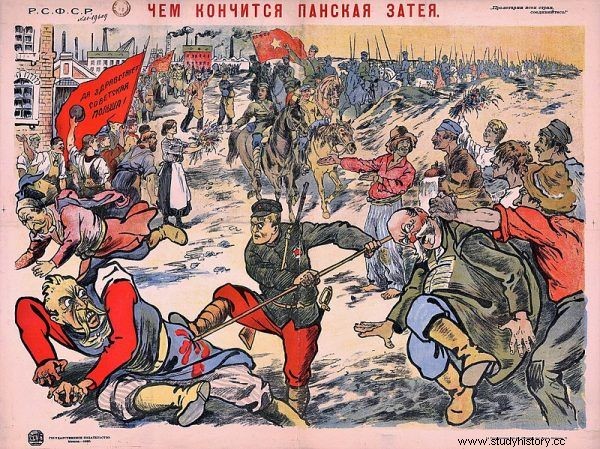
Here's what your ideas end up with - Soviet propaganda poster from 1920
gen. Władysław Sikorski:
Tukhachevsky [...] rejected throughout the front, he had to flee with the remnants of his armies to find cover behind the Nemunas and the Bug. [...] The invasive plans of the Soviet government collapsed. The Polish army, on the other hand, achieved a victory in this short time based not only on the unshakeable moral foundations of the righteousness of the cause it defends, but also giving us great material benefits and ensuring Poland a future dependent only on its citizens.
This historic success was achieved not only as a result of the mistakes made by the Russian side at the end of the war, but above all thanks to the discipline and patriotic dedication of the entire nation and the moral revival of soldiers based on these values. […]
In 1920, the concerted effort of the entire nation and its leaders won over the Vistula. […]
The date of the last battle on the Vistula - although unlike the Great World War it did not involve millions of armies - is a particularly important date, not only for Polish history.
Lev Trotsky:
The strategic error during the Polish war had enormous historical consequences. Piłsudski's Poland emerged from the war unexpectedly strengthened. On the other hand, the Polish revolution suffered a severe defeat. [...] Lenin, of course, understood better than everyone else the meaning of the "Warsaw" error.
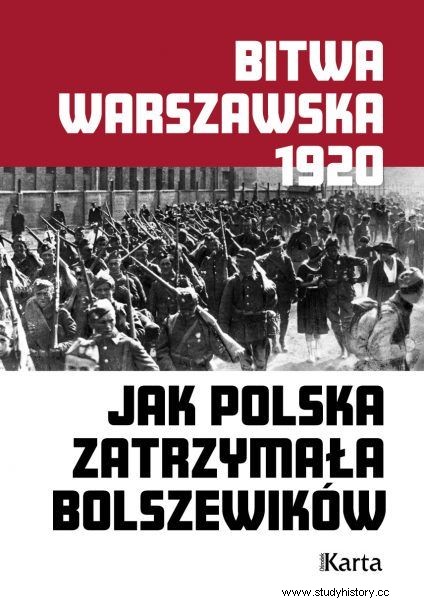
The article is an excerpt from the book Battle warszawska. How Poland stopped the Bolsheviks , which has just been released on the market by the Karta Publishing House.
Józef Piłsudski:
The work of war is an art. Art creates works, and the object of the art of war is always victory. Victory, then, is sought by each commander as a product of his command work, his work of brain, nerves and will. The work of the troops commanded by a commander is actually a materialization of what the commander thought, experienced and invented before this work. […]
The moment of triumph, when, in a furious battle gallop, enemy army after army slammed, fleeing in panic as their triumphs so recently shone, will forever be the victory of the command power.
Source:
The article is an excerpt from the book Battle warszawska. How Poland stopped the Bolsheviks , which has just been released on the market by the Karta Publishing House.
